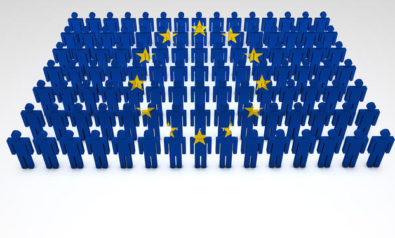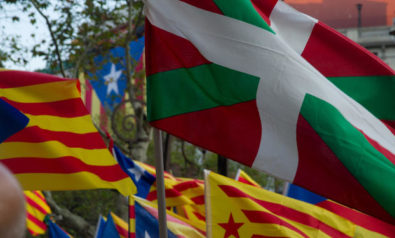The former Prime Minister of Ireland, John Bruton, disccusses the political and economic stresses that might lead to the break-up of the European Union, and its consequences for member states. This is the first of two parts.
I have attended a number of conferences in the past few weeks where the future of the European Union has been discussed. Where previously the EU’s continuance was complacently taken for granted, now there is much more uncertainty, but also much more interest.
The European Union has been a remarkably successful political experiment. It is the first ever voluntary coming together of sovereign states, pooling some of their sovereignty, so that they could do more together than they could separately.
Almost every other political unification or state building in history has involved the use of force, including the creation of the UK and the USA. The EU came together peacefully and voluntarily.
Some might argue that the EU was necessary only in order to cement a post war reconciliation of Germany and France and that, now that that is achieved, it has done its job and needs no further development.
This is wrong for two reasons.
Why the EU is Still an Asset
1. An assurance of mutual security
Firstly, the fact that there is a queue of states still lining up to join the EU shows that the EU still provides a political umbrella under which reconciliation and mutual security between states can be assured.
This was why the Baltic states, Poland and other central European states joined, and it is the reason several Balkan states, and even Georgia and Ukraine might like to do so. It is also the reason why Greece, much to the surprise of many, has favoured Turkish membership. While the United States of America is remarkably successful in many ways, there is no queue of other American states lining up to join. Even Puerto Rico has not done so after more than 100 years of Washington rule.
2. A way to manage globalisation democratically
Secondly, the EU is the most advanced effort in the world to introduce a measure of democratic supervision into globalisation. Unlike other efforts by the United Nations and the World Trade Organization, the EU has a directly elected Parliament which co-legislates for the EU alongside the 27 Governments, who often decide issues by majority. Other international organisations operate on a purely intergovernmental basis, which means that decisions must be made unanimously, and democratic involvement only arises when a deal already negotiated in private needs to be ratified in national parliament without possibility of further negotiation or amendment.
As a result, other organisations, like the WTO and the UN can do much less, – and do much more of what they do behind closed doors – than is the case with the EU.
My view is that the EU provides a model for democratic rule making at a supra-national level – something which will become more, not less, necessary as we proceed into the 21st century. Indeed the failure to deal with climate change is a good example of the weaknesses of present intergovernmental models of global governance. If the different regions of the world had Unions, like the EU, which could negotiate seriously, and with genuine political legitimacy – as the EU can – the failures of Copenhagen and other climate change summits would not have happened.
If the EU were to break up, either because of the collapse of the euro or because a major country like the UK feels it has to exercise its right to leave the EU, and either event were to set off a breakdown of the trust that keeps the EU together, we would have lost a unique instrument for security building in Europe, and for problem solving in the wider world.
I would now like to analyse those two potentially existential threats to the EU: the euro crisis, and the UKs possible desire to leave. Of these, a possible break up of the euro is undoubtedly by far the more serious existential threat to the EU, because the scale of the economic losses is potentially much greater, and the means of controlling those losses is much less.
The Euro Crisis is Not Solved
The euro crisis has become slightly less acute in recent weeks. The announcement of a new bond buying policy by the European Central Bank has calmed the markets. But there is no doubt that the markets will test the ECB’s willpower at some stage.
Meanwhile, the link between the solvency of European banks and the solvency of European states has not been removed.
A default by any EU state would wreck the banks of that state because each state’s banks are big time purchasers of the bonds of that state.
Similarly a collapse of a bank in a state would force that state to inject capital into banks, if it did not want a run on banks generally to take place, and a potential spread of that contagion to other countries. The resulting confidence loss would lead to a collapse in state revenues, leaving it with a much increased budget deficit at the very time it was also having to find the money to recapitalize the banks.
Four Things That Must be Done to Solve it
If these problems are to be resolved, four things will have to happen, more or less at the same time.
1. Greek Government debt will have to be forgiven.
2. The European Stability Mechanism (ESM) will have to be seen to be big enough, on a contingency basis, to stand behind Spain and other countries that might come into difficulty.
3. The new mechanisms of supervision and, if necessary, rationalisation of Europe’s banks will have to be put in place.
4. The already-agreed reforms to reduce deficits and to promote growth by opening up the job and service markets to competition, will have to be demonstrated to be fully implemented in letter and spirit, to show creditors that, if one forgives debt or creates enlarged contingency funds, one is not throwing good money after bad. One of the reasons growth potential has been low in Greece, Italy, and Spain is lack of competition or flexibility in key sectors.
At the moment, the Greek debt issue is not being tackled, and seems to have been postponed until after the German election in September. The delay may not be the worst thing in the world, if it allows time for Greek reforms to begin to establish credibility. It also allows time to educate public opinion in creditor countries like Germany – and in countries sitting complacently on the sidelines – of the true consequences for themselves of a euro break up. Greece also need immediate help to finance itself to the end of 2013, and this bridging finance cannot wait for elections in Germany or anywhere else.
The EU has already enacted a raft of legislation, including the Fiscal Compact Treaty, to ensure that countries reduce their deficits, and liberalise their labour and service markets.
But Germany is not yet satisfied. It wants to have an EU Commissioner with the power to veto state budgets, and enforceable contracts on reforms between states and the EU. But Germany, France and other core countries could also be doing a lot more themselves to open up their own digital, financial, energy, retail and professional service markets.
Germany has set a good example in labour market and pension reform, but there are other reforms it could initiate, that would help other EU countries to sell more goods and services into the German market, and thereby trade their way out of their problems.
There is understandable political resistance in Germany to any further debt forgiveness for Greece. But debt forgiveness within the euro is one thing. Greek exit from the euro is an entirely different matter.
What Would Happen if the Euro Zone Broke Up?
Even a disorderly default by a country within the euro, no matter how severe its consequences for its own people and for its creditors, would have far less serious consequences for the euro, and for the EU itself, than an exit of a country from the euro would have.
I have heard a view from some Northern Europeans that an orderly exit of Greece from the euro could be contemplated, if accompanied by building up a huge fund, much bigger than the existing ESM, to stand behind all other euro area states, so as to prevent a Greek exit leading to a loss of confidence in the financial position of the rest of the euro zone.
I believe this view that the Greek exit from the euro can be managed is profoundly mistaken.
The whole edifice of the EU rests on law. The EU has no police force to enforce its will. It relies on member states freely respecting the interpretation of EU law by the European Court of Justice, and implementing the Court’s decision, however unpleasant that may be. The exit of a country from the euro is, quite simply, a breach of their Treaty obligations and treaty obligations have the force of law.
The euro was established on the basis that it was irreversible. A Greek exit, particularly indeed if it was condoned or encouraged by other members, would say loudly that the euro is not irreversible.
That would lead to constant speculation in the markets as to who would be next. And as speculation increased so too would the size of the funds or guarantees needed to check it. That in turn would lead heightened risk that some of the creditor countries, who would have to provide these funds and guarantees, might decide that they themselves should exit the euro and re-establish their own currencies. That would be the end of the euro.
Breakups of currency unions have happened before, in Austria-Hungary after the First World War, and in Eastern Europe in the 1990s when the rouble zone broke up. As described in a recent article by Anders Aslund of the Peterson Institute of International Economics, the consequences of this were disastrous.
A scenario that might lead to the end of the EU itself
New currencies would have to be established. The relative value of these currencies would be unknown and unknowable. Some would lose value very quickly and others would shoot up in value. Exports would become dramatically uncompetitive in some cases, and in others they would become so cheap that there would be accusations of dumping, currency manipulation, and calls for immediate reintroduction of import duties to level the playing field. Such duties, if imposed, would break up the single market. That would be tantamount to the break-up of the European Union itself. Open markets – the assumption on which Ireland built it entire economy over the last 50 years – would be gone.
In some countries the banking system would break down, and people would have no access to credit for even the most basic transactions. In others, people would cease to trust the value of their own money, and money, after all, is based on a promise and if people can no longer trust the states standing behind the promise, the basis for money is gone.
This is not fiction. It is what happened when the rouble zone broke up in the 1990s and explains why incomes fell by 50% in the former rouble zone countries. The exporter nations within the rouble zone, like the Russian Federation, suffered just as much hardship as the importer nations, like Latvia and Estonia.
The political stresses that this scenario for the 500 million people of the EU, and their Governments, would be such that trust between European nations would easily break down completely.
We see signs of that happening already, but it is being held in check by the hope that problems can still be resolved on a collective basis. A break-up of the euro would show that that was impossible, and it would then be a case of every nation for itself, with particularly severe consequences for smaller countries like Ireland.
Click here to read the final part.
Image: Copyright © Shutterstock. All rights reserved
The views expressed in this article are the author's own and do not necessarily reflect Fair Observer’s editorial policy.
Support Fair Observer
We rely on your support for our independence, diversity and quality.
For more than 10 years, Fair Observer has been free, fair and independent. No billionaire owns us, no advertisers control us. We are a reader-supported nonprofit. Unlike many other publications, we keep our content free for readers regardless of where they live or whether they can afford to pay. We have no paywalls and no ads.
In the post-truth era of fake news, echo chambers and filter bubbles, we publish a plurality of perspectives from around the world. Anyone can publish with us, but everyone goes through a rigorous editorial process. So, you get fact-checked, well-reasoned content instead of noise.
We publish 2,500+ voices from 90+ countries. We also conduct education and training programs
on subjects ranging from digital media and journalism to writing and critical thinking. This
doesn’t come cheap. Servers, editors, trainers and web developers cost
money.
Please consider supporting us on a regular basis as a recurring donor or a
sustaining member.
Will you support FO’s journalism?
We rely on your support for our independence, diversity and quality.













Comment